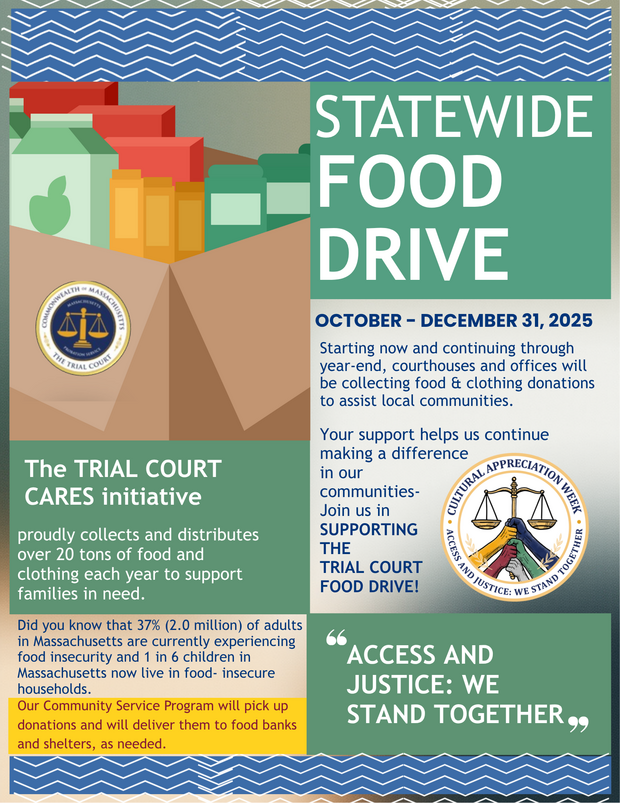- Massachusetts Probation Service
Media Contact
Coria Holland, Communications Director
The Massachusetts Trial Court’s Annual Food Drive begins today and court employees, attorneys, and members of the public are encouraged to bring non-perishable food items to courthouses and Community Justice Support Centers where collection bins will be available. This year, slightly used or new clothing will also be collected.
The drive will run through December 31st and benefit charitable organizations and food pantries across the state.
Each year, the Massachusetts Trial Court hosts a month-long food drive after the court system’s Cultural Appreciation Week, the longest running and largest celebration of community, diversity, equity, inclusion, and belonging in any US court system.
The Trial Court Cares drive is organized by the court’s Cultural Proficiency Champions, who participate in diversity and inclusion training and assist court users in navigating the court system.
More than 15 tons of food was collected and distributed to charitable agencies across the state last year. Organizers hope to collect as much or more.
“We feel it is important to support the communities we serve across our Commonwealth. Our courthouses are community courts where compassion and empathy goes hand-in-hand with access to justice. In these challenging and difficult times, it is important that we help our neighbors who are experiencing hardships,” said Pamerson O. Ifill, Probation Commissioner.
“As we continue to assess needs in our communities, food and clothing insecurities are at an all time high. Please consider donating nonperishable food items and slightly used or new clothes,” said Dr. Carmen Z. Gomez, Deputy Commissioner for Pretrial Services.
The food and supply drive launched during the Pandemic when a Champion introduced the idea of helping those experiencing “food insecurity.” The U.S. Department of Agriculture (USDA) defines food insecurity as "a lack of available financial resources for food at the household level.”
Nearly 40 percent — more than 1.6 million — of adults in Massachusetts do not know where their next meal is coming from. One in six children in the state lives in food insecure homes, according to Feeding America.
Top 9 items food banks need MOST:
- Peanut Butter. Liked by both kids and adults, and high in protein, peanut butter is the most requested item by food banks. Consider donating peanut butter alternatives (https://moveforhunger.org/blog/best-peanut-butter-and-jelly-brands-donate) too!
- Canned Proteins. Canned chicken is a great way to provide versatile, high-protein items to those in need. Items like canned tuna and salmon also contain vitamins, omega-3 fatty acids, and protein which make a quick and easy meal.
- Canned Beans. Canned beans - like black beans, garbanzo beans, black-eyed peas, green beans, and pinto beans - are high in protein and fiber and provide a nutritious way to fill a hungry tummy.
- Pasta & Pasta Sauce. Super easy to make and exceptionally filling, pasta and pasta sauce are great items to include in your donation box. Opt for whole grain pasta since it offers more fiber and nutrition than white pasta.
- Pantry Staples. Can you imagine having to cook in a kitchen without any flour or sugar? Unfortunately, this is a reality for many food insecure households. Donating items like flour, sugar, or condiments will greatly benefit those in need.
- Canned Vegetables. Veggies are always high in demand, and for good reason. Nutrient-rich, and fiber dense, they tend to last the longest in pantries and are the perfect, easy way to provide healthy options.
- Cooking Essentials, like olive oil and spices. In many food insecure households, access to cooking basics isn’t available often. Stick to the basics, like garlic powder, minced onion, oregano, basil, salt, pepper, and cinnamon.
- Formula. In food insecure communities, many parents are unable to breastfeed but struggle to buy formula due to the high costs. While there are programs available that provide formula to low income families, it never hurts to have more than enough.
- Baby Food. For the same reason, you should donate formula, it’s a good idea to donate any unused baby foods that may be hiding in your pantry.

